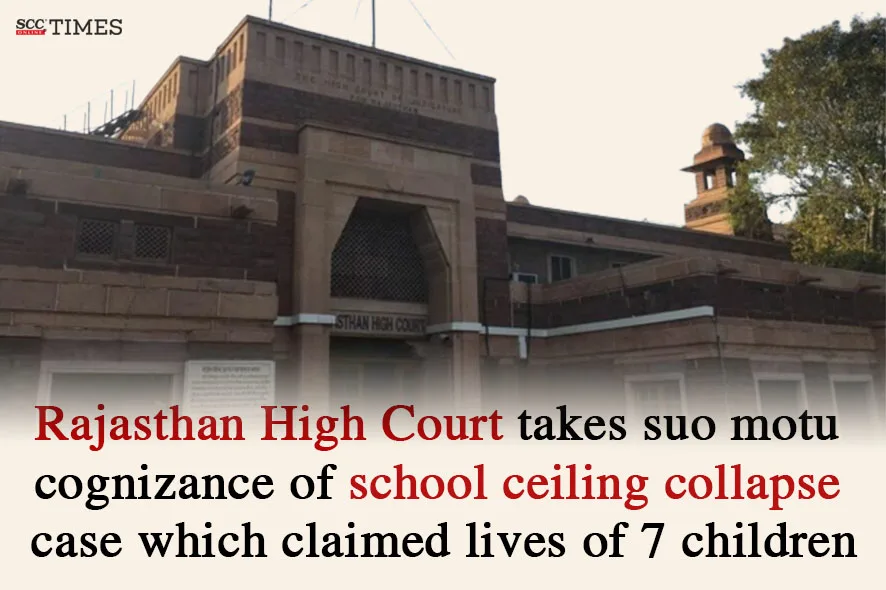Rajasthan High Court: While taking suo moto cognizance based on news in media sources about collapse of ceiling and wall of a classroom of a Government Upper Primary School situated in Village Piplod, District Jhalawar on 25-07-2025 which claimed lives of 7 students and injured dozens of other children currently battling for their lives in the hospital, a Single-Judge Bench of Anoop Kumar Dhand, J., issued directions to the Central and State Governments to take effective steps for improving the education system, particularly focusing on school infrastructure, safety, and well-being of children.
The Court took note of a report by the National Commission for Protection of Child Rights (‘NCPCR’) on ‘Safe and Secure Environment’, which highlighted critical concerns about school infrastructure. Based on a survey conducted in 12 States, including Rajasthan, covering over 26,000 schools, the NCPCR report revealed that approximately 22% of operational school buildings are in a dilapidated condition, and around 31% have structural cracks, raising serious concerns about the safety and security of children.
The Court noted that a safe and secure environment is a prerequisite for effective teaching and learning in critical institutions as schools which are shaping citizens of tomorrow. Thus, ensuring the safety of children, teachers and staff members during disasters is necessary & imperative.
The Court observed that according to the Unified District Information System for Education Plus (‘UDISE’) reports, Rajasthan Government allocates 6% of its total budget to infrastructure development of government schools but a substantial number of government schools lack proper building conditions, labs, functional toilets, electricity, and drinking water facilities, with girls forced to not drink water or hold and delay urination at the risk of UTIs, distended bladders and gynaecological problems. Further the absence of separate girls’ toilets coupled with non-availability of free sanitary pads, hampers their physical health, academic performance and limits their future opportunities. This includes lack of proper library with small rooms, lack of books, no internet connectivity, with rural areas being most affected. Access to quality education continues to be a significant challenge. These conditions discourage students from attending schooling leading to higher dropout rates. The issue is not limited to government schools.
The Court noted that building safe schools should be priority for architects, engineers, policy makers, administrators and emergency response planners as children in schools are the most vulnerable during disasters with many schools exposed to various hazards. School safety includes within its ambit structural safety of the buildings. Every child has right to receive education in a safe school environment and it is the duty of the State to improve educational infrastructure.
The Court issued show cause notices to the respondents as to why the following directions be not issued to them:
- To conduct an immediate survey of all school buildings in the State to ensure that the school premises are safe and not in dilapidated condition that could pose a threat to the lives and safety of students.
- To ensure that all the schools in the State implement adequate measures to ensure the safety of their students.
- To provide appropriate compensation to the parents of the children who have lost their lives as well as to all the students, injured in the school disaster and to ensure access to quality medical treatment and continued education for the affected children in future as well.
- To ensure that both urban and rural areas have enough government schools for the children proportional to the population of the area.
- To ensure that every school has separate and hygienic toilets for boys and girls along with installing free sanitary vending machines near girls toilet in schools and providing free sanitary napkins for girls.
- To ensure regular supply of electricity along with adequate lighting and fan facilities in all classrooms for the students, the teachers and the staff working in the school premises.
- To establish libraries with all relevant books and computer labs equipped with adequate and reliable internet facilities for the students.
- To develop an online portal and website at every district level, where the students and their parents can submit their grievances including issues related to school infrastructure, with photo evidence and other issues affecting and relating to their studies.
- To create a “Redressal Mechanism Forum” to look into the grievances of the students/the parents and resolve the same quickly without any delay.
- To fix liability and accountability upon the individuals for poor quality construction of school infrastructure and in the event of any causality or tragedy, in future, to recover the cost of construction from the negligent individuals found liable and responsible.
- To hold a discreet enquiry against all the individuals who are responsible for such incidents and initiate appropriate departmental and criminal actions against them.
-
To constitute district-wise monitoring committees to oversee the infrastructure of all the schools lying in urban and rural areas on monthly basis.
The Court directed a report to be summoned from the Chief Secretary of the State of Rajasthan and the Secretary of the Ministry of Education and Child Development, New Delhi, regarding the effective steps taken by the State and the Centre on the issues involved in this petition. A copy of the order was directed to be sent to all respondents for their intimation and for submitting a compliance report before the Court on or before the next date. The Court listed the matter for 01-08-2025.
[In the matter of Safety and well-being of school going children v. Union of India, 2025 SCC OnLine Raj 3638, decided on 28-07-2025]


